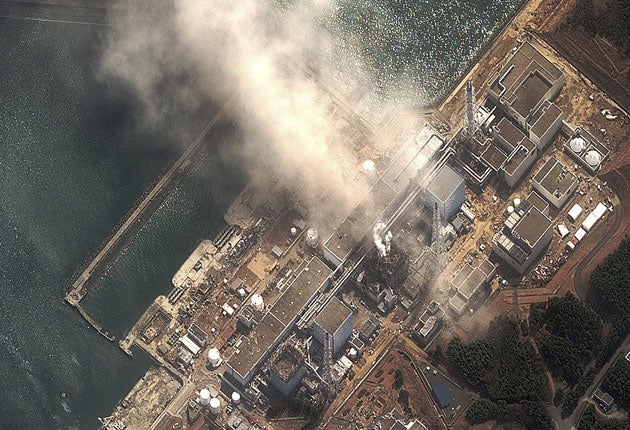Hope returns to Japan as nuclear fears abate
Engineers stabilise reactor and are confident electricity will soon be restored, but the human misery continues

Your support helps us to tell the story
From reproductive rights to climate change to Big Tech, The Independent is on the ground when the story is developing. Whether it's investigating the financials of Elon Musk's pro-Trump PAC or producing our latest documentary, 'The A Word', which shines a light on the American women fighting for reproductive rights, we know how important it is to parse out the facts from the messaging.
At such a critical moment in US history, we need reporters on the ground. Your donation allows us to keep sending journalists to speak to both sides of the story.
The Independent is trusted by Americans across the entire political spectrum. And unlike many other quality news outlets, we choose not to lock Americans out of our reporting and analysis with paywalls. We believe quality journalism should be available to everyone, paid for by those who can afford it.
Your support makes all the difference.After the bleakest nine days in its post-war history, Japan will start today with a crumb of optimism amid the first, tentative signs that it could yet avert catastrophe at its stricken nuclear plant.
Engineers hoped to restore power to the cooling systems at Fukushima Daiichi's damaged reactors this morning, if overnight equipment tests proved successful. Their aim is to restart water pumps that have been out of action since the main and back-up power systems failed following the 11 March earthquake and tsunami.
It is hoped that electricity to all six reactors will be restored by the end of today, after a 1.5km power cable was connected outside the plant yesterday, but there is no guarantee that the cooling systems will work given the extent of the damage. Hidehiko Nishiyama, the deputy director general of Japan's Nuclear and Industrial Safety Agency, said: "To return the situation to normal we need power to bring the temperature down with normal methods."
Workers reported the first breakthrough at the plant yesterday, claiming to have stabilised reactor No 3 – widely considered the most dangerous because of its use of plutonium – after fire engines spent half a day dousing overheated nuclear fuel rods. In a further signal that Japan may yet turn the corner, even the 6.1-magnitude quake that struck Ibaraki prefecture yesterday – one of many aftershocks – failed to inflict further damage, despite its epicentre being close to Fukushima.
The nuclear accident, which on Friday was upgraded to level 5 out of 7 – putting it on a par with the 1979 Three Mile Island disaster in the US – has overshadowed the humanitarian calamity in the country's ravaged north-east.
With much of the international – if not the local – media fixated on the possibility of meltdown, many Japanese feel the outside world has overlooked their plight. Every day, estimates of those known to have died or who are still missing soar ever higher. Japan's National Police Agency said yesterday that 7,348 people had died, with a shade fewer than 11,000 still unaccounted for, presumed dead. Many families will never know what happened to those washed away by the 30ft-high tsunami and the ensuing mudslide that devastated many villages and small towns.
Sub-zero temperatures are exacerbating the struggle to survive for the 390,000 people, many elderly, left homeless, especially as food, water, medicine and fuel are in short supply, and travel is still difficult.
In the ruined towns, the search now is for bodies rather than miracles. Tayo Kitamura watched in tears as firefighters pulled her 69-year-old mother, Kunilo, from the rubble of Onagawa, a coastal town preparing to mourn almost half of its 10,000 residents. The dead almost certainly include Mizue Yamamura's husband, Yoshio, although that didn't stop the 76-year-old braving the icy wind to look for him. Even a body to mourn would be better than nothing.
For the survivors, the strain of living with the uncertainty of the threat posed by the crippled Fukushima plant has been immense.
The operator of the 40-year-old facility, Tokyo Electric Power, faces mounting criticism over its handling of the disaster. But its president's public apology for "causing such great concern and nuisance" appeared to underplay the incident. The first signs that radiation is starting to permeate the country's food and water supplies were detected yesterday.
Traces of radioactive iodine, which the International Atomic Energy Agency said can cause short-term health problems, have been found in milk from a farm just inside the 30km Fukushima exclusion zone and in spinach grown in the neighbouring Ibaraki prefecture. In Tokyo, 240km south of the stricken plant, tiny levels of radioactive iodine were found in tap water, but at 1.5 becquerels per kg iodine-131, they were well below the tolerable limit for food and drink of 300 becquerels per kg.
So far, Tokyo has all but escaped the aftermath of the giant quake. That hasn't stopped residents from fleeing the capital. The Foreign Office issued advice yesterday on what to do if radiation levels increase significantly to British nationals who have chosen to disregard official advice to "consider leaving" Tokyo. Staff handed out iodine tablets in Tokyo, Sendai and Niigata as a "contingency measure", warning that scientific advice was that the situation was not yet serious enough to warrant taking them. Other tips for coping with a "worst-case scenario" included staying inside or showering immediately on return.
Arjun Malhotra, 24, has decided to stay in the country despite the offer of seats on two British government-chartered flights that left yesterday for Hong Kong. "People who have decided to go home are doing so because of pressure from people at home rather than fear at this end," the English teacher said.
Join our commenting forum
Join thought-provoking conversations, follow other Independent readers and see their replies
Comments